
Scania AB is a major Swedish manufacturer headquartered in Södertälje, focusing on commercial vehicles—specifically heavy lorries, trucks and buses. It also manufactures diesel engines for heavy vehicles as well as marine and general industrial applications.

Leyland Motors Limited was a British vehicle manufacturer of lorries, buses and trolleybuses. The company diversified into car manufacturing with its acquisitions of Triumph and Rover in 1960 and 1967, respectively. It gave its name to the British Leyland Motor Corporation, formed when it merged with British Motor Holdings in 1968, to become British Leyland after being nationalised. British Leyland later changed its name to simply BL, then in 1986 to Rover Group.
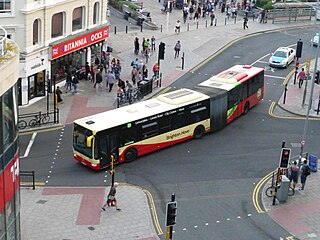
An articulated bus, also referred to as a bendy bus, tandem bus, stretch bus, or an accordion bus, is an articulated vehicle used in public transportation. It is usually a single-decker, and comprises two or more rigid sections linked by a pivoting joint (articulation) enclosed by protective bellows inside and outside and a cover plate on the floor. This allows a longer legal length than rigid-bodied buses, and hence a higher passenger capacity, while still allowing the bus to maneuver adequately.
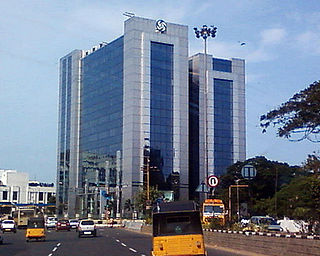
Ashok Leyland is an Indian multinational automotive manufacturer, headquartered in Chennai, Tamil Nadu, India. It is owned by the Hinduja Group. It was founded in 1948 as Ashok Motors and became Ashok Leyland in the year 1955. Ashok Leyland is the second-largest manufacturer of commercial vehicles in India, the third-largest manufacturer of buses in the world, and the tenth-largest manufacturers of trucks. With the corporate office located in Chennai, its manufacturing facilities are spread across the country namely Ennore, Bhandara (Maharashtra), Hosur, Alwar (Rajasthan) and Pantnagar (Uttarakhand).

Metro Cammell Weymann Ltd. (MCW) was once a major contributor in transportation manufacturing in the UK and Europe. It was established in 1932 by Metro-Cammell's bus bodybuilding division and Weymann Motor Bodies to produce bus bodies.
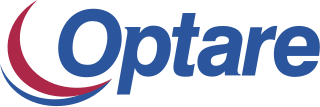
Optare is an English bus manufacturer based in Sherburn-in-Elmet, North Yorkshire. It is a subsidiary of Indian company Ashok Leyland.

A midibus is a classification of single-decker minibuses which are generally larger than a traditional minibus but smaller than a full-size single decker and can be anywhere between 8 metres and 11 metres long. While used in many parts of the world, the midibus is perhaps most common in the United Kingdom, where operators have found them more economical, and to have a sufficient number of seats compared to full size single-decker buses.

The Scania OmniCity is an integrally constructed transverse-engined low floor city bus that was available from Scania on the European market between 1997 and 2012.

East Lancashire Coachbuilders Limited was a manufacturer of bus bodies and carriages founded in 1934 in Blackburn, Lancashire, England.

Charles H Roe was a Yorkshire coachbuilding company. It was for most of its life based at Crossgates Carriage Works, in Leeds.

The Scania low floor city bus and coach range was introduced by Scania in 1997 as a successor to the 3-series bus range.

The Optare Olympus is a double-decker bus built by Optare. It could be built as a body available on Alexander Dennis Enviro400, Volvo B9TL or Scania N230UD/N270UD chassis with the 2-axle and 3-axle variants.

A single-decker bus or single-decker is a bus that has a single deck for passengers. Normally the use of the term single-decker refers to a standard two-axled rigid bus, in direct contrast to the use of the term double-decker bus, which is essentially a bus with two passengers decks and a staircase. These types of single-deckers may feature one or more doors, and varying internal combustion engine positions.

Bendy buses were rarely used in the United Kingdom compared to other countries, until the turn of the millennium. This was due to the UK preference for the quintessential double-decker bus for use on high capacity routes. As of June 2006, there were over 500 articulated buses in the UK, although they are still heavily outnumbered by double deckers. The majority of this fleet was used in London, although these buses would be withdrawn by end of 2011.
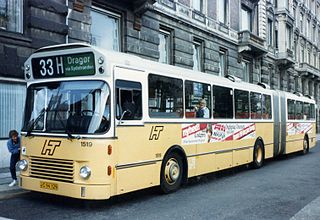
The Leyland-DAB articulated bus was an articulated bus manufactured by Leyland-DAB in Denmark. The Leyland-DAB artic found customers in Denmark, and was the first modern style articulated bus in the United Kingdom, albeit with limited repeat orders.

Bus manufacturing, a sector of the automotive industry, manufactures buses and coaches.

MAN Truck & Bus SE is a subsidiary of MAN SE, and one of the leading international providers of commercial vehicles. Headquartered in Munich, Germany, MAN Truck & Bus produces vans in the range from 3.0 to 5.5 t gvw, trucks in the range from 7.49 to 44 t gvw, heavy goods vehicles up to 250 t road train gvw, bus-chassis, coaches, interurban coaches, and city buses. MAN Truck & Bus also produces diesel and natural-gas engines. The MAN acronym originally stood for Maschinenfabrik Augsburg-Nürnberg AG, formerly MAN AG.

The Leyland Royal Tiger Worldmaster, sometimes simply known as the Leyland Worldmaster, was a mid-underfloor-engined single-decker bus or single-decker coach chassis manufactured by Leyland between 1954 and 1979.

The East Lancs OmniDekka is a double-decker bus built for sale in the UK market, introduced by East Lancashire Coachbuilders in 2003. Originally built on Scania N94UD chassis at Euro 3, and later Scania N230UD and N270UD at Euro 4 and Euro 5, the bodywork consists of a modified East Lancs Myllennium double decker, but with the standard front end cowl and windscreen replaced with that of Scania's own integral OmniCity. Through takeovers of East Lancs, production of the OmniDekka was latterly carried out by the Darwen Group and finally Optare before ceasing in 2011.
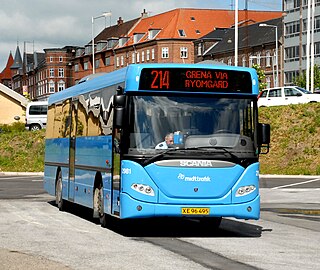
The Scania OmniLine was a single-deck intercity bus manufactured by Scania between 2000 and 2009. It was launched as the first normal-floor member of the Scania Omni range with the first buses being delivered in 2000. It was first produced by DAB in Silkeborg, Denmark, and was also technically just a facelift from DAB's latest model, which was known as the DAB Facelift. The technical name for the model was Scania IL94IB, which indicates that it was built on the L94IB chassis. It was available in lengths of 12.0 and 13.5 metres and a floor height of 960 mm. In 2003, Scania sold the Silkeborg plant to Norwegian bus builder Vest Busscar, and production of the OmniLine was moved to Baltcoach OÜ in Tartu, Estonia.





















